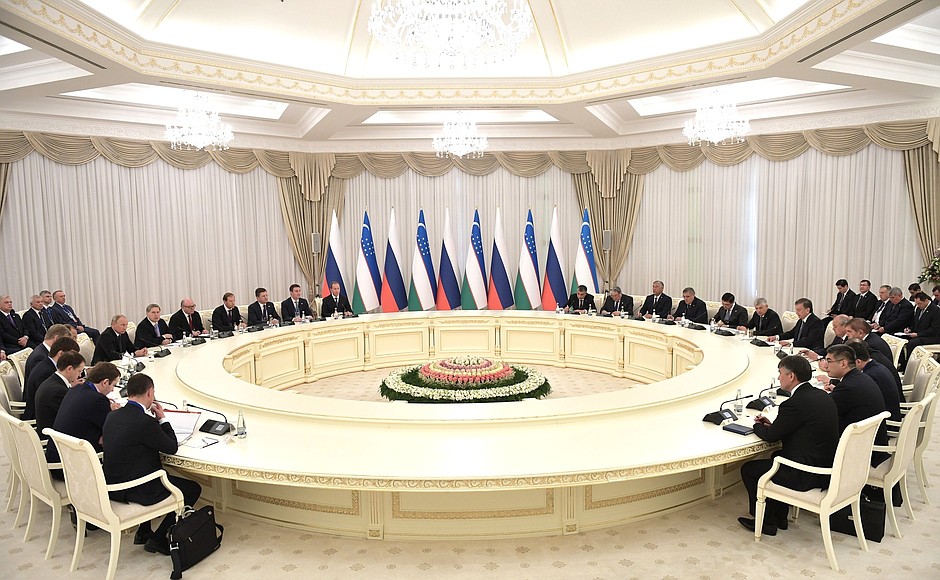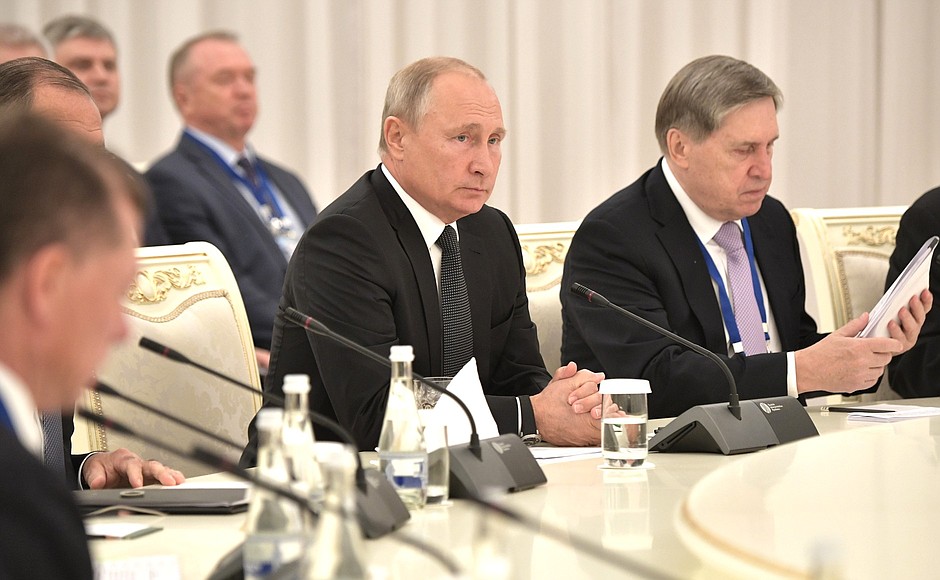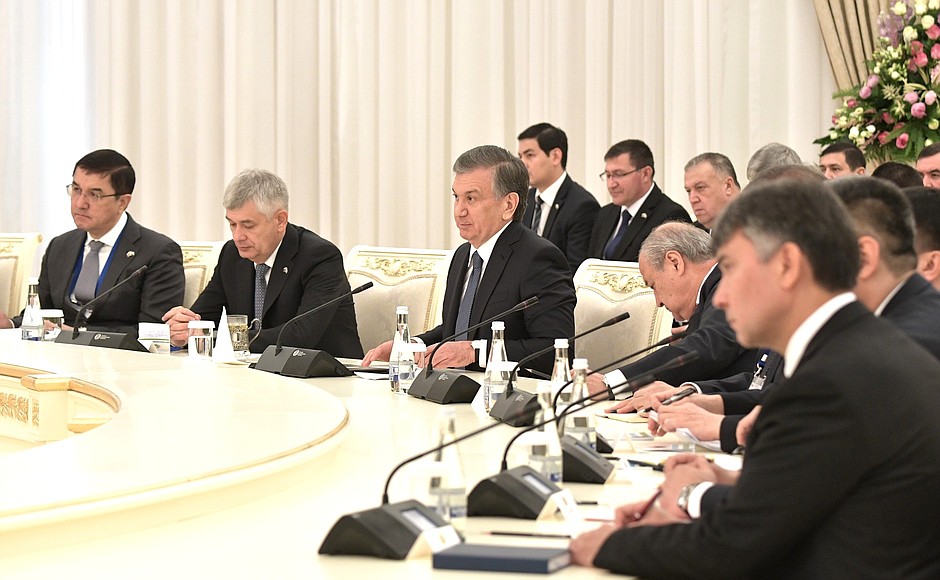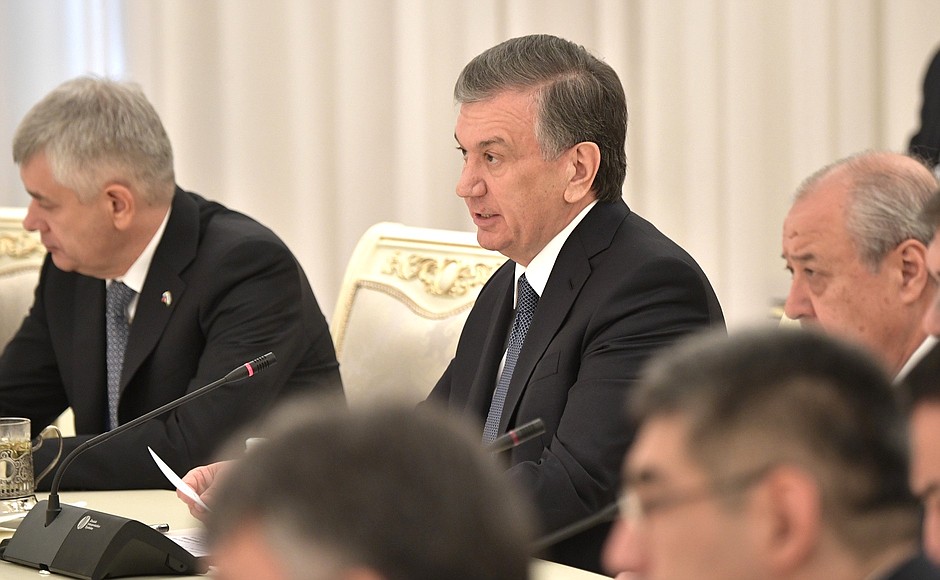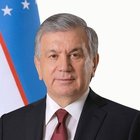President of Uzbekistan Shavkat Mirziyoyev: Mr President, colleagues,
Let me sincerely welcome you to the hospitable country of Uzbekistan. Promoting a trust-based and open political dialogue with Russia will always be among Uzbekistan’s top priorities. We have common history, close economic and cultural ties, friendly, and I would say family bonds between our people.
During the talks in restricted format, President Putin and I discussed topical issues related to bilateral cooperation and to the international and regional agendas. I would like to note that our positions on all issues are identical or similar. We have determined the bilateral agenda for further cooperation. Today in the restricted format discussion, we covered in great detail, openly and in confidence the entire range of issues: development of political contacts, as well as trade, economic, investment, military and military-technical cooperation, and the promotion of scientific, cultural and humanitarian ties that all serve the interests of both states.
Let me note that contacts at various levels have largely intensified: over 80 mutual visits took place last year. I completely support the proposal on reforming the activities of the intergovernmental commission. Interregional exchanges have also gained a new impetus. We will continue this future-oriented work.
This year, trade has reached $6 billion. According to our estimates, it will reach $10 billion in two years. We have built a large portfolio of investment projects with leading Russian companies and banks, such as Gazprom, Gazprombank, Lukoil, Rosatom and Vneshekonombank, worth about $25 billion for the next five years. (We have already discussed this in the restricted format.) Our main task is to implement them on time and with high quality. We have the necessary potential. I am sure that the adoption of the intergovernmental economic cooperation programme for 2019–2024 will promote this.
For millennia, Russia has been a spiritual and cultural centre, the most important bridge between western and eastern civilisations. This is why the development and promotion of cultural ties is among our priorities. The first joint educational forum, New Professionals for the New Economy, was held in Tashkent on the eve of your visit, Mr President. Over 80 heads of leading Russian universities attended. I have already said that over 100 cooperation agreements in education and science have been signed.
I suggest listening to brief reports of our countries’ economy ministers on the state and prospects of bilateral cooperation.
In conclusion, I would like to note that the strategic alliance that characterises relations between our countries is not just words, not just a goal, but reality proven by actions. Mr President, let me express my sincere gratitude for your personal contribution to promoting friendship, mutual trust and cooperation between our countries.
I am pleased to give you the floor, Mr President.
President of Russia Vladimir Putin: Thank you very much, Mr President.
Thank you for the invitation and for your assessment of our joint work. As I have already said in the restricted attendance meeting, Uzbekistan is our strategic partner and a reliable ally. I also share your opinion that we are united by friendship and mutual cooperation deeply rooted in the past.
We also note that of late Uzbekistan has been undergoing serious changes, which make it possible to take our cooperation to an absolutely new level. I am primarily referring to the transformations that you are carrying out in Uzbekistan’s economy. I am absolutely sure that before long this will have a tangible impact on the living standards of Uzbekistan’s citizens.
For our part, we intend to develop our relations further and, of course, the $5–6 billion in trade turnover, which we mentioned earlier, are not our final goal. We can say that, given the conditions you are creating for Russian economic operators in Uzbekistan, it is just a start, just the beginning.
We attach great importance to cooperation not only in the energy sector, which is taking on a new edge, but also in industry. Machine-building, pharmaceutical, healthcare and medical technology production projects are being discussed, and some are already being implemented.
As you noted, we have prepared an extensive cooperation programme in a variety of areas, the first stage of which amounts to $25 billion. But if we implement it – and I have no doubt that we will – the cumulative effect will be much greater because it is going to generate profit, create new and highly productive jobs and open up new opportunities for cooperation.
Humanitarian projects are a significant component of our cooperation. Uzbek students constitute the greatest portion of all foreign students in the Russian Federation, and the number of young people studying at universities of the Russian Federation continues growing rapidly. We can also see your interest in setting up branches of Russian universities in the Republic of Uzbekistan. The fact that colleagues from various universities of Uzbekistan and Russia are working on cooperation plans here now gives us reason to believe that we will soon reach a much higher level in this field.
We are grateful for your attention and support of the Russian language. Nine hundred schools in Uzbekistan teach Russian; 70 percent of Uzbek citizens are fluent in Russian. We are ready to provide help in this sphere.
We view defence and military technical cooperation as another equally important area for cooperation, very sensitive and important for ensuring the security of both states. Several hundred officers of the Uzbek army study at military schools in Russia.
We are ready to develop military technical cooperation and extend it from the delivery of weapons and modern equipment to joint production of this equipment at industrial facilities in Uzbekistan.
As for the delivery, we have made this decision as an exception. As you know, defence products are supplied to Uzbekistan at domestic prices.
We cooperate in many other areas. We will analyse what is going on in the most careful way and will do our utmost to move forward in all the fields that were identified during your visit to the Russian Federation on April 4 last year.
Thank you very much.
<…>
